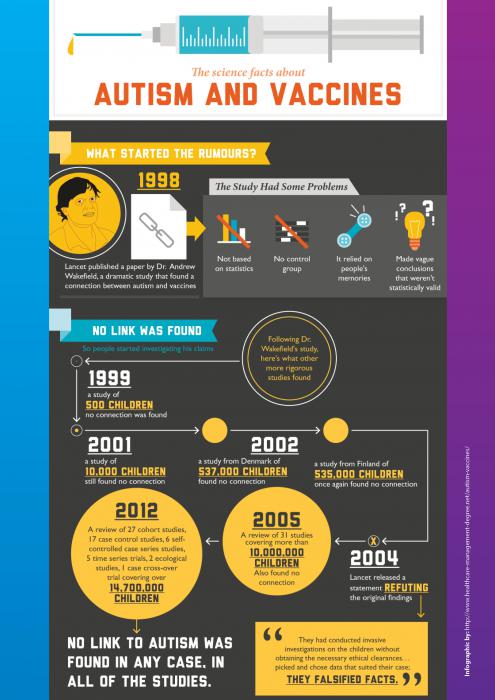One way or another, you have likely heard of the term "anti-vaxxers," or people who disagree with the use of vaccines. The arguments defending anti-vax lifestyles may vary, but one particularly ugly misconception is that vaccines cause autism in children. Despite the rumor being completely, unquestionably proven wrong, the harmful effects of spreading this lie are beginning to show. Outbreaks of viruses "eradicated" long ago are beginning to plague our society once again, and even newer diseases such as COVID-19 are posing a threat to a public reluctant to be vaccinated. But before we go into the current situation, let's start at where the vaccine-rumor was first started.
ANDREW WAKEFIELD
There are a lot of words to describe Andrew Wakefield and his work, and none of them are nice. Andrew Wakefield was a former British doctor who suggested there was a connection between the measles, mumps, and rubella (MMR) vaccine and autism in children. His "findings" were published in 1998 by The Lancet before being quickly swept up into a media frenzy. Of course, this created a huge panic within the public (both local and internationally). However, the truth is that Andrew Wakefield's research was more than just flawed and sketchy; most of it was a flat-out lie! Basically, Wakefield made up his findings in an attempt to get rich and famous, no matter how much damage his fake research inflicted upon society. Here's a list of things that you should know about him and his stupid study:
- Wakefield had been paid by a law board to find if there was evidence to support a litigation case. The case involved parents who believed the MMR vaccine had harmed their children. (conflict of interest alert!)
- The sample consisted of a mere 12 kids (WAY too small to be applied to every child in the world, don't you think?).
- Wakefield changed the numbers in his data and lied about the subjects' medical histories to make his claim seem true.
- Nobody bothered to fact check him or question the findings before they were published - not the other ten co-authors, not The Lancet, no one.
BUT WAIT, THERE'S MORE
Eventually, the research community caught on to Wakefield's deceit and the study has been officially retracted. And just to be absolutely sure there was no reason to fear vaccines, there have been countless of quality studies conducted on thousands of participants around the world testing for the same thing. Not a single study found any connection between vaccines and autism.
THE AFTERMATH
To this day, there are still anti-vax websites citing Wakefield's redacted research as factual evidence against vaccines. In all fairness, opposition to vaccines has been around since the end of the 19th century - long before this idiot came around. But this incident has held the most weight in terms of it's impact on public opinion. Even though Wakefield's work is completely fraudulent, the damage has been done. Vaccine-preventable diseases such as the measles are now becoming increasingly common again, and the mortality rates associated with these outbreaks are not to be taken lightly.
It is important that we continue to talk about the truth behind false medical findings to ensure that we as a society stay informed. We must protect ourselves, our peers, and our children as best as we can, especially from dangerous viruses that we know how to kill.



Comments
Post a Comment